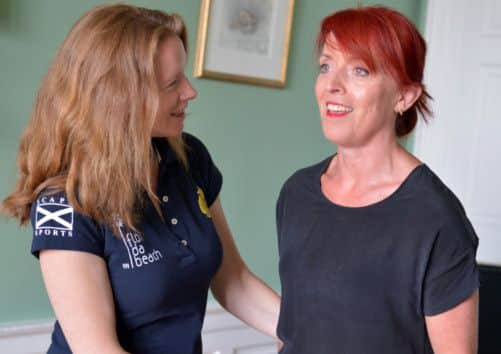How learning to sing can improve your health


‘The only thing better than singing is more singing’
Ella Fitzgerald
‘He who sings frightens away his foes’


Cervantes.
‘If I cannot fly, let me sing’
Stephen Sondheim
‘Singing promotes health, breathing, circulation and digestion’


John Harvey Kellogg
IT’S an instinct more primal than speech, something that comes so naturally to human beings that we’ve probably been doing it for longer than we’ve been talking to each other. But somewhere along the evolutionary scale we lost our enthusiasm for singing, leaving it to the professionals, while the rest of us less vocally gifted mortals would only occasionally warble away to the radio when we thought no-one else could hear.
Advertisement
Hide AdThen came karaoke bars and gradually we started to find our voices again. Television shows such as Glee, The X Factor and The Voice and films such as Pitch Perfect followed. Then everyone’s favourite gleek, Gareth Malone, brought us The Choir and, it seems, Britain fell in love with singing all over again.
There are now, it is claimed, more choirs in the country than fish and chip shops – 153 Scottish-based groups are listed on the British Choirs website, from the wonderfully named A Choired Taste in Kilmarnock to Wildfire Women’s Choir in Edinburgh. And that indication of our changing national tastes is good for our health in more ways than the obvious one. Because research has shown that singing has physical as well as psychological benefits: relieving pain, reducing stress and even helping us live longer.
Which seems as good a reason as any to join Micheline Van Hautem for a singing lesson. The talents of this chanteuse – that seems the best word to describe the purring, passionate Belgian with a voice like chocolate – have been praised by both Madonna (who attended the premiere of 1987’s Crazy Love with Sean Penn and demanded to know who the film’s incredible singer was) and by Jacques Brel’s nephew, who said she was the best female interpreter of his uncle’s legendary songs. She also just happens to be in Edinburgh performing the songs of Brel at The Famous Spiegeltent.
The first thing to understand, however, is that while singing may come naturally to all human beings, to do it properly takes discipline and training. So, for around the first 40 minutes of our hour-long singing lesson we don’t actually sing. What we do is warm up – a combination of stretching and loosening up a little like yoga – and learn about breathing properly. That breathing, it turns out, must come not from the chest but from way down below the belly button (but not too far down). When I take a breath, I must feel it there.
“Where the muscles of the back and the belly come together is your pyramidalis muscle,” says Van Hautem. “Practise by putting your fingers on it, breathe in and make a long f-sound as you go out. Cough or laugh to find the spot. Then, as you make progress, make the f-sound faster.”
Once I’ve found the elusive pyramidalis muscle, I must start thinking about my posture. “Stand with feet shoulder-width apart,” she says. “Open the chest, relax the shoulders and bend the knees. And relax the jaw and cheeks.”
Which is easier said than done.
Advertisement
Hide AdThen, when it finally comes to making a sound, that’s just what it is – a series of sounds rather than words: aaahhhs and eeeees and ooohhhs, long drawn-out notes followed by scales and a technique that sounds like a slide whistle. Up and down we go. No place for inhibitions. “Open your chest, relax your shoulders and let the air move through your cords. Make space as if you are yawning,” says Van Hautem.
I need to keep my chin down, despite being constantly tempted to raise it up, and let my mouth fall slack. “Think of cleaning your glasses, of opening up your palate,” she advises.
Advertisement
Hide AdVisualisation helps too, and Van Hautem suggests imagining a river flowing above my head. “Pick the sound out of the air like a leaf on that river.” I pluck that imaginary leaf out of the air with my fingers and, actually, it works. The sound is purer, less breathy.
“It sounds so simple but you have to work very hard in order to be free. The way to improve is to be consistent with it – retrain the muscles. It’s not a click; it’s not just because you understand it that you can do it.”
And it’s true, it’s much harder work than I imagined, but the results are really quite surprising. And the feeling of singing, of making that most natural of sounds, without worrying about being judged or humiliated is wildly uplifting.
From studying the behaviour of isolated tribes, and from the history of other ancient cultures, researchers can say with some certainty that singing has been a vital activity – along with cooking and eating – for bonding, worship and socialising since the earliest of times. Darwin theorised that our ancestors probably sang love songs to each other before they were even able to speak.
And while many of us would claim we simply cannot sing or are tone-deaf, evolutionists maintain that our minds and bodies are genetically hard-wired to produce singing noises, and to listen and respond to others’ singing.
If the evolutionary theory isn’t compelling enough, medical studies have presented growing evidence that the benefits go far beyond the simple feel-good factor. Professor Graham Welch, chair of music education at the University of London, has been studying the subject for more than 30 years and says: “Singing has physical benefits because it is an aerobic activity that increases oxygenation in the bloodstream and exercises major muscle groups in the upper body, even when sitting. It has psychological benefits because of its normally positive effect in reducing stress levels through the action of the endocrine system, which is linked to our sense of emotional wellbeing. Psychological benefits are also evident when people sing together as well as alone because of the increased sense of community, belonging and shared endeavour.”
Advertisement
Hide AdA report in the Journal Of Music Therapy in 2004 echoed his research, suggesting that group singing helped people cope better with chronic pain. And in 2008, a joint study by Harvard and Yale Universities claimed choral singing in one Connecticut town had contributed towards the residents’ increased life expectancy.
Then last year more research, this time at Cardiff University, found lung cancer patients who sang in a choir had a greater expiratory capacity than those who didn’t. And this year the New Scientist reported that singing in choirs helped synchronise members’ heart rates. That research, carried out by the University of Gothenburg in Sweden, concluded choir singing could achieve the same meditative calming effects as the breathing exercises in yoga.
Advertisement
Hide AdIt must be true, because when I check my watch, our hour has long gone and I feel I’ve barely begun. We end by singing Wonderful World together, me echoing Van Hautem’s lines – words that could hardly be more appropriate as we look across the rooftops of a sunny Edinburgh to the glinting Forth in the distance. And while I may not be joining her on stage at the Spiegeltent any time soon, I’m not entirely embarrassed by my efforts.
Who knows, if I practise – “a little bit every day: support in the belly, let go of the throat/chin and open up your crown to resonate, you can do it,” she tells me – I might even live longer. I’ll almost certainly be happier.
Twitter: @Ruth_Lesley
Physical benefits
1 Singing can help reduce anger and depression and anxiety.
2 It can improve sleep
3 It’s good for the heart and circulation because it improves aerobic capacity and decreases muscle tension.
4 It tones facial muscles.
5 It improves posture.
6 Sinuses and respiratory tubes are opened up.
7 It can help decrease snoring.
8 It releases pain-relieving endorphins.
9 It boosts the immune system.
10 It can help people with conditions such as Parkinson’s regain balance.
Emotional benefits
1 It’s good for self-esteem and confidence.
2 It enhances the mood.
3 It reduces stress.
4 It encourages creativity
5 It promotes bonding